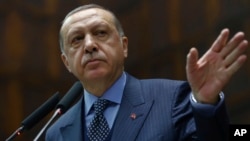Turkish President Recep Tayyip Erdogan is reacting angrily after testimony in a New York trial implicated him in an alleged multi-million-dollar scam to evade U.S.-imposed sanctions against Iran. His reaction is adding to concerns Ankara is on a collision course with U.S. courts that could have financial and political repercussions.
“We have trade and energy ties with Iran. We did not breach the sanctions (on Iran). Whatever the verdict is, we did the right things,” Erdogan was reported to have said to his ruling party executives Thursday.
Mehmet Hakan Atilla, deputy head of the Turkish state-owned Halkbank, is on trial, accused of facilitating an elaborate scheme to circumvent U.S. sanctions on Iran. Prosecutors allege the scheme involved billions of dollars and involved senior government members.
During testimony Thursday, Turkish-Iranian gold trader Reza Zarrab, the prosecution's star witness who has pleaded guilty in the case, accused Erdogan and his then-finance minister, Ali Babacan, of being aware of the sanctions evasion scheme. Zafer Caglayan, a former economy minister and Erdogan ally, is also indicted in the case but remains at large.
Turkish media, which are heavily influenced by the president, have criticized the trial as being politically motivated and aimed at undermining Erdogan. Government spokesman Bekir Bozdag joined in the condemnation. “The objective of this trial is to destroy their credibility and harm them in the eyes of the Turkish public and the world. That is clear,” Bozdag said, speaking to reporters Thursday.
Such conspiracy theories play well in a country that is traditionally suspicious of the United States. “Some people in Turkey do not think the American judiciary is as independent as it's made out to be. We’ve seen cases before where this actually proved to be the case,” notes international relations expert Soli Ozel of Istanbul’s Kadir Has University
With a combination of hostility toward the United States among the president's supporters and a compliant media, Erdogan is widely predicted to be able to contain any political fallout from the trial.
Suspicions were heightened further by Turkish prosecutors Friday when they issued an arrest warrant for Graham Fuller, the former vice chairman of the National Intelligence Council of the U.S. Central Intelligence Agency, in connection with a failed coup last year.
Some analysts suggest the Turkish president might even turn the ongoing New York case to his advantage by playing the victim at the hands of a more powerful aggressor, a move that often plays well among the electorate. The financial markets, however, may not be so forgiving.
In the run-up to the trial, the Turkish lira suffered heavy declines, which could continue because of the prospect that some Turkey’s state banks could face massive fines, if convicted. Thursday’s testimony saw two other state banks implicated for sanctions evasion along with Halkbank. “If big bill penalties are prepared for several Turkish banks, that would obviously shake the Turkish financial industry,” warns Soli Ozel.
There is precedent for such fears. Several European banks have already been hit hard for Iranian sanctions violations by U.S. courts, most notably the Paris-based BNP Paribas Bank that was fined $9 billion.
Turkish state banks such as VakifBank have strongly rejected accusations of wrongdoing. “VakıfBank has always acted in compliance with laws and related legislation and shown utmost care and diligence to act in accordance with the laws and the related legislation,” read a statement released Friday.
Given the strong pushback by Erdogan and the Turkish banks, the question increasingly being asked is whether Ankara would pay any fines imposed on its banks by U.S. courts for sanctions violations. Failure to do so would raise not only political but financial consequences.
“The political risk scenario we are talking about could be something else,” warns economist Inan Demir of Nomura Bank. "It could inflict greater pain than the recent depreciation episodes that we’ve seen in Turkey. It could mean more significant tightening of the external funding conditions for Turkey. This could mean the external financing constraints turn binding on Turkey. That would have significant effects on the currency and growth,” said Demir. Underpinning Demir’s concerns is that Turkish banks and companies have to pay back around $170 billion in loans in the next 12 months.
Erdogan is also facing growing domestic pressure. The main opposition Republican People’s Party, or CHP, on Friday produced what it said was evidence to support their accusation the president’s close family, including one of his sons and brothers, along with members of his inner political circle, deposited more than $15 million into an offshore bank account. Erdogan has demanded that CHP leader Kemal Kilicdaroglu produce evidence to back up the claim made Tuesday.
The government says the accusations are part of another conspiracy against the president. Erdogan Thursday repeated his charge that Kilicdarolgu and his party have committed treason and pose a threat to Turkey. The leader of the second largest parliamentary opposition pro-Kurdish HDP party, lawmaker Selahattin Demirtas, has already been in jail for more than a year on terrorism charges.





